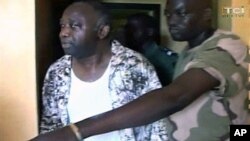Former Ivory Coast president Laurent Gbagbo has been captured by fighters backing the country's internationally recognized president.
He was captured at the presidential residence after U.N. and French attack helicopters fired rockets into the compound Monday morning.
"Mr. Gbagbo and his wife have been arrested and they are in custody," said Hamadoun Toure," said Hamadoun Toure, the spokesman for the U.N. mission in Ivory Coast.
Toure says no U.N. troops were involved in Mr. Gbagbo's capture which he says was carried out by fighters supporting internationally-recognized president Alassane Ouattara.
Those fighters were backed by French special forces who used a convoy of more than 30 tanks and armored personnel carriers to advance on the compound, where Mr. Gbagbo was holding out in an underground complex, refusing to recognize that he lost November's presidential vote.
Mr. Gbagbo's capture ends the four-month political standoff between the presidential rivals. Gbagbo troops slowly deserted their leader as French, U.N. and Ouattara forces increased the pressure on the incumbent president. More than 300 members of his Republican Guard surrendered Monday less than two hours before he was captured.
Still at large are many members of the youth wing of Mr. Gbagbo's political party, who human rights groups say have been attacking Ouattara supporters. With Mr. Gbagbo's capture, Toure says restoring law and order in Abidjan is now the top priority.
"During the fighting we witnessed an increase in banditry activities," said Toure. "Young armed people were roaming around breaking into houses, carjacking, snatching people's mobile phones and valuables. That has to stop of course. It is a challenge."
Ouattara forces swept across Ivory Coast when international mediators failed to convince Mr. Gbagbo to give up power. They reached Abidjan 12 days ago but were unable to capture the presidential compound where hundreds of Gbagbo loyalists held them off with heavy weapons.
U.N. and French helicopters attacked the compound one week ago, but still Ouattara forces could not fight their way in. U.S. and U.N. officials say Gbagbo troops used a brief ceasefire to regroup and rearm and late last week were regaining ground in Abidjan.
That momentum appears to have collapsed when U.N. and French attack helicopters again bombed the presidential compound Sunday. U.N. Secretary-General Ban Ki-moon said the attacks were carried out because Gbagbo forces were using heavy artillery and mortars to attack the U.N. base in Abidjan as well as Mr. Ouattara's headquarters.
Mr. Gbagbo and his wife Simone are now being detained at Mr. Ouattara's hotel headquarters where Ouattara officials say the former leader will be brought to justice for crimes against the Ivorian people.
| Key events in Ivory Coast political crisis, culminating in capture of former President Laurent Gbagbo | |
| Late 2010 | After five years of delays, Ivory Coast holds a presidential election. Incumbent Laurent Gbagbo leads after first round but official results show him losing run-off to former Prime Minister Alassane Ouattara. The Gbagbo-controlled constitutional council annuls 10 percent of ballots as fraudulent and proclaims Mr. Gbagbo winner. |
| December 2010 | The United Nations, African Union, the west African bloc ECOWAS recognize Mr. Ouattara's victory and urge Mr. Gbagbo to step down. The incumbent refuses and his forces blockade Mr. Ouattara in an Abidjan hotel, where he is protected by U.N. peacekeepers. |
| December 2010/January 2011 | ECOWAS and AU send mediators to Abidjan in unsuccessful attempts to resolve the power struggle peacefully. The West African regional bank cuts off Mr. Gbagbo's access to state funds. Gbagbo troops fight deadly battles in Abidjan with Ouattara supporters. |
| March 2011 | Pro-Ouattara fighters, including former rebels from Ivory Coast's 2002 civil war, capture towns in western Ivory Coast, near border with Liberia. |
| March 28, 2011 | Pro-Ouattara fighters launch a huge offensive, capturing towns and cities across Ivory Coast and moving to outskirts of Abidjan within four days. |
| April 4 | French and U.N. helicopters attack Gbagbo-controlled heavy weapons in Abidjan, on the grounds they are being used to attack civilians and U.N. peacekeepers. French and Ivorian officials say Mr. Gbagbo is negotiating surrender, but the incumbent then gives interviews insisting he won election. |
| April 6 | Gbagbo loyalists fight off an attack by Ouattara forces on the presidential compound. |
| April 10 | French and U.N. helicopters launch airstrikes on the compound. |
| April 11 | Mr. Gbagbo is captured at residence after assault by pro-Ouattara fighters, aided by French special forces. |
| Discuss this story with other readers on VOA forums |




